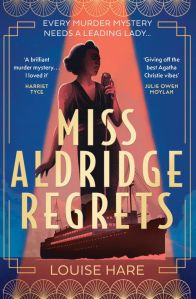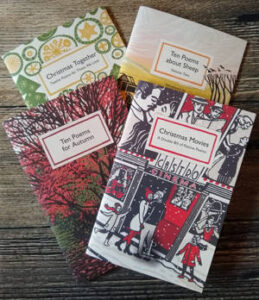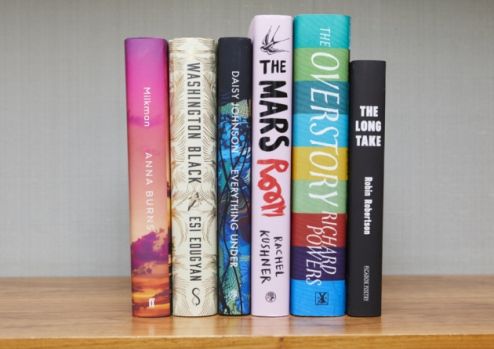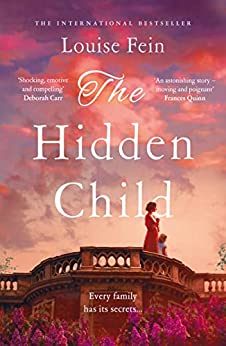About the Book
In Old Sins, DCI Kelso Strang is taking his first break for years, holidaying with an old Army friend in North West Scotland. Taking the opportunity to indulge his love of hill-walking, he spends a day climbing Suilven, the ‘Sugarloaf’ mountain. Sleeping over in a bothy, he wakes in the middle of the night to hear the unmistakable howl of a wolf.
There is unease, too, that the death of an elderly lady who fell off a cliff has been accepted as an accident by the police. When Strang looks into it he discovers that, while there was nothing to say that it wasn’t one, she had had a remarkably chequered past.
7. I like to end my Q&As with the same question so here we go. During all the Q&As and interviews you’ve done what question have you not been asked that you wish had been asked – and what’s the answer?
And then with one voice they said, ‘She shall be a writer.’ And that’s the way it’s always been.
I’ve written stand-alones and series novels and I definitely prefer the series. My first was set in Galloway with DI Marjory Fleming, and I loved writing it. Her whole family grew in personality with each book and was a strand in itself outside the investigation, and I know my readers got to thinking of them as friends. With a stand-alone, at the end of the book the characters effectively die – they’re certainly not there any more. With a series you can feel that the life of the main character goes on until you rejoin them for the next book. Kelso Strang is developing a hinterland that plays more of a part in each new story, and even now, just before Old Sins is published, I’m writing the next instalment of his life.
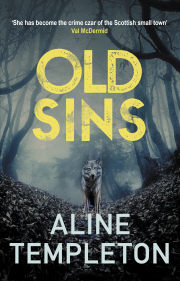
The essence of drama is conflict and I was drawn to the idea as a starting pad for the story that was weaving itself in my mind – a story about obsession and retribution and retribution and petty jealousy too.
1. Tell us a little about Old Sins.
Like many Scots families, our summer holidays were spent on the North West coast of Scotland. It rains a lot in August, and if the sun comes out there are midges, but somehow the sheer majesty of the mountains and the glorious seascapes – is there any more beautiful sight than the Summer Isles on a sunny day? – work their way into your soul. Even now when the nose of the car points north to take the Road to the Isles, my heart lifts.
Aline Templeton’s books include Human Face, Carrion Comfort, Devil’s Garden and Cold in the Earth. Her latest novel, Old Sins, is published by Allison & Busby on 18 November.
I suppose the answer is, a bit of both. I do the agonising, beating-the-head-on-the-desk planning to shake out what the story is really going to be about, who the characters are and how they relate to each other – and what their names are, even.(I have a sort of Rumpelstiltskin complex and feel they won’t speak to me until I get their name right.) I have a general idea about how I think the story will end – but I could be wrong. As the plot goes on, it throws up new ideas; as the characters develop they impose a sort of logic on what has to happen. And, I have to admit, sometimes they do take on a life of their own and I just have to write fast to get it on to the screen. Those are the brilliant days, the days that feed the addiction and stop me chucking it all in on the days when it’s all about wading through treacle.
I love to cook and I love singing – you can’t think about the problem with the plot when you’re belting out the Hallelujah Chorus – and I have a particular interest in the Far East where we’ve fantastic visits over the years. And then of course there are the grandchildren who delight me with the funny things they say and the freshness of the way they look at the world.
First and foremost, of course, I read, though crime fiction isn’t my favourite reading. It’s a bit like a busman’s holiday, and there’s always the tendency to think, ‘I wouldn’t write it like that.’ Then of course, if it’s brilliant it only depresses you. After I read John le Carré’s The Constant Gardener, I said to my husband in despair, ‘I don’t know why I bother.’
Sean Reynolds is obsessive about rewilding his Auchinglass estate and there are rumours that he’s taken illicit steps to hurry that on, to the anger of the local farmers. But there are other tensions too. An elderly lady had died some months before, officially in a tragic stumble off a cliff path on her way home from the pub. But she was a woman burdened with many secrets and guilt for sins of her own and her closest friend believes her death was not accident, but retribution.
4. Old Sins is the 4th Kelso Strang novel. What are the benefits and downsides to writing a series?
6. If you could only read one book for the rest of your life which book would it be?
It looks as if that may be the explanation when her niece is murdered. But is it? Strang and his team find themselves pursuing lines of enquiry that head off in apparently contradictory directions and place them ultimately in deadly danger.
I think I demand the Desert Island Discs privilege of the Bible and Shakespeare, but after that it’s hard. The ones I read and re-read are Jane Eyre and Wuthering Heights, I suppose, and Emma. And The Secret Garden. Oh, and Georgette Heyer’s The Grand Sophy. But just one? It’s only poetry that you can go back to again and again and find new depths you haven’t seen before, so I’m going to say The Oxford Book of English Verse. Is that cheating?
And then of course, it would give me a reason to spend researching time in one of my favourite parts of the country – Lochinver and points north.
So with re-wilding and conservation being high on the public agenda, I was thinking a lot about the conflicts that must inevitably arise when the people who have spent harsh and demanding lives wrenching a living from the land for centuries feel that they are being asked to sacrifice their own prosperity by ideological townies with no skin in the game.
There has been a lot of talk about re-wildling and bringing back the wolf to its ancient ranges, and he discovers that local farmers are claiming the owner of a local estate, who is running a conservation project, has installed one already and that their livestock is suffering.
2. What inspired the book?
3. Are you a plan, plan, plan writer or do you sit down and see where the words take you?
Why don’t you give up writing, when you spend your life lying awake at four o’clock in the morning worrying about all the plot problems and deadlines? The answer is that I have never felt I had any choice. It was always what I needed to be, for better or worse. In fact, I have a fantasy that when I was born my parents had a christening party for me, to which they invited the Good Fairy. She tiptoed over to my cradle, all pink chiffon and sequins, and cooed, ‘Oooh, what a dear little thing! I must give her a wonderful gift.’ But while she was thinking what it should be, the door slammed open and in stomped the Bad Fairy in black rags, DMs and a filthy temper because she hadn’t been invited. She looked at me and said, ‘Yuck, what a disgusting little brat! I shall put on a horrible curse.’
5. What do you do when you aren’t writing? What do you do to relax and get away from it all?
Before Covid, my biggest relaxation was always the ‘Inspiration Week’ in a house in France when I could sit on the terrasse in the sun, a glass of something chilled to hand and read all the books I’d been wanting to have time to read all year. I make up a menu of choices for the day;: something solid and nourishing in the morning, a lighter repast of fiction in the afternoon – post siesta, of course -; a canapé of poetry to accompany an early evening drink and a nightcap of comforting light reading to take to bed.
Aline kindly answered a few of my questions.
On cold, clear, moonlit night in late October, DCI Kelso Strang stepped outside the bothy on Suilven and heard, faint but unmistakable, the howl of a wolf. An unsettling sound – but it isn’t the only unsettling thing about the remote township of Inverbeg in Sutherland, where he’s taking a break with an old army friend.


